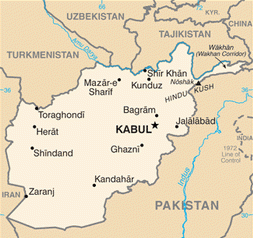Washington has yielded to pressure from Afghan President Hamid Karzai, agreeing to cede control of all Afghan prisons to Kabul upon departure of most U.S. troops in 2014.
 The Obama administration had been in talks with Karzai over the U.S. role in Afghanistan post-2014, consistently demanding they retain control of Afghanistan’s prisons and that they continue to perform night raids with Special Operations forces, who are supposed to take a leading role in terrorizing Afghanistan after the drawdown.
The Obama administration had been in talks with Karzai over the U.S. role in Afghanistan post-2014, consistently demanding they retain control of Afghanistan’s prisons and that they continue to perform night raids with Special Operations forces, who are supposed to take a leading role in terrorizing Afghanistan after the drawdown.
While a deal has not yet been reached on the issue of JSOC night raids, which Karzai has strictly opposed, the Obama administration gave in to pressure from Kabul. Even the detention facilities at Bagram airbase, in which the U.S. is holding 3,000 detainees, many without charge or trial and who have been subjected to torture, will be placed under Afghan control.
The issue had been a high priority since an Afghan investigative commission accused the American military of abusing detainees in the Bagram prison facilities and reiterated President Hamid Karzai’s demand that the U.S. turn the detainees over to Afghan custody. Attorney for Human Rights First Daphne Eviatar said in a recent CBS interview of Bagram that “It’s worse than Guantanamo, because there are fewer rights.”
But Afghan control of prisons is unlikely to be much better. Back in October, the United Nations released a report which found that detainees in Afghan-controlled prisons were hung from the ceilings by their wrists, severely beaten with cables and wooden sticks, had their toenails torn off, were treated with electric shock, and even had their genitals twisted until they lost consciousness. The study, which covered 47 facilities sites in 22 provinces, found “a compelling pattern and practice of systematic torture and ill-treatment.”
In one sense, the treatment of detainees will be criminal whether Washington or Kabul is in control. But in another sense, the Kabul government is supported by the United States with money, arms, and training, and will continue to be after the transfer takes place. So really the U.S. is responsible for the poor treatment in either case.


